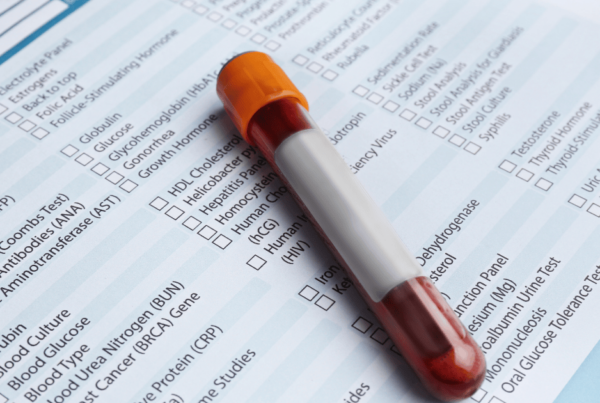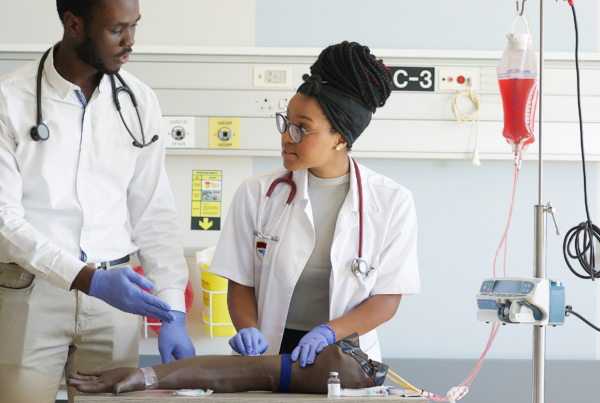For phlebotomists, understanding which blood tests need to be fasting is critical. Proper preparation of patients before a blood test can significantly impact the accuracy of the results, especially when fasting is required. This guide will explain the importance of fasting, the specific tests that require it, and best practices for phlebotomists to follow.
| Key Takeaways |
| Fasting is essential for specific blood tests, including glucose and lipid panels, to ensure accurate results. |
| Most tests require 8 to 12 hours of fasting, primarily involving only water intake. |
| Always consult your healthcare provider for specific instructions regarding fasting, medications, and test preparation. |
| Notify your provider if you accidentally consume food or drink before your fasting blood test. |
Why Is Fasting Required for Certain Blood Tests?
Fasting before certain blood tests helps provide more accurate and reliable results. When a person eats or drinks, their body processes nutrients such as sugars, fats, and proteins, which can temporarily alter the levels of various substances in the bloodstream. This can interfere with specific blood tests, leading to skewed results.
For phlebotomists, ensuring that patients fast before certain tests is essential for accurate diagnosis and treatment. Improper fasting can lead to misinterpretations, unnecessary repeat tests, and delayed diagnoses.
Key Blood Tests That Require Fasting
1. Fasting Blood Glucose Test
- Purpose: To measure the glucose (sugar) levels in the blood and diagnose diabetes or monitor its treatment.
- Fasting Period: 8–12 hours.
- Why Fasting Matters: Eating increases blood sugar levels, which can lead to inaccurate results. Fasting ensures that the blood sugar measurement reflects the body’s natural glucose levels, rather than a post-meal spike.
2. Lipid Panel (Cholesterol Test)
- Purpose: To assess cholesterol levels, including total cholesterol, LDL (bad cholesterol), HDL (good cholesterol), and triglycerides.
- Fasting Period: 9–12 hours.
- Why Fasting Matters: Triglycerides, one of the key components measured in this test, increase after a meal. Fasting allows for accurate measurement of cholesterol levels, which is essential in evaluating the risk of heart disease.
3. Basic Metabolic Panel (BMP)
- Purpose: To assess kidney function, electrolyte levels, and blood glucose. This test is critical for evaluating overall metabolic health.
- Fasting Period: 8–12 hours.
- Why Fasting Matters: Fasting ensures accurate measurement of glucose and electrolytes without interference from recent food intake.
4. Comprehensive Metabolic Panel (CMP)
- Purpose: Similar to BMP, but with liver function testing. It provides a broader assessment of the body’s metabolism and organ health.
- Fasting Period: 8–12 hours.
- Why Fasting Matters: Fasting prevents food-related fluctuations in glucose and other vital markers, giving a clear picture of the body’s metabolic state.
5. Iron Level Tests (Including Ferritin and Total Iron-Binding Capacity)
- Purpose: To measure iron levels in the blood and diagnose conditions such as anemia or iron overload.
- Fasting Period: 8–12 hours.
- Why Fasting Matters: Recent meals can affect iron absorption and alter test results, which could mislead diagnosis and treatment.
The Role of Phlebotomists in Fasting Blood Tests
As a phlebotomist, your role is not only to draw blood but also to ensure that the patient is properly prepared for their blood test. This is particularly important for tests that require fasting, as patient compliance directly impacts the accuracy of the results.
1. Educating the Patient
Phlebotomists must ensure patients understand the importance of fasting and provide clear instructions about how to fast. Remind patients to refrain from eating and drinking anything other than water for the specified fasting period.
2. Verifying Fasting Compliance
Always ask patients if they have fasted as instructed. If they haven’t fasted or are unsure, consult with the healthcare provider before proceeding. A non-fasting patient may need to reschedule the test to avoid inaccurate results.
3. Handling Common Patient Questions
Patients often have questions about what they can consume during a fast, or how their medications affect fasting. Phlebotomists should know the basic guidelines, such as allowing water, but advise patients to avoid other beverages like coffee, tea, or juice, as these can affect the results.
FAQs About Fasting for Blood Tests
Can I drink water during fasting?
Yes, drinking water is encouraged. Staying hydrated can make it easier to draw blood and does not affect test results. However, avoid beverages such as coffee, tea, or juice.
Can I take my medication while fasting?
In most cases, regular medications should be continued, but patients should always confirm this with their healthcare provider. Some medications may need to be taken with food, and others could interfere with certain test results.
What happens if I eat before my fasting blood test?
If a patient accidentally eats or drinks (besides water) before a fasting blood test, it’s important to inform the phlebotomist or healthcare provider. The test might need to be rescheduled to avoid inaccurate results, particularly for tests like glucose or lipid panels.
When can I eat after undergoing a fasting blood test?
Once the blood test is complete, the patient can resume normal eating and drinking. It’s often a good idea to bring a small snack to eat right after the test, especially if the fasting period was long.
Best Practices for Fasting Blood Tests
Here are some practical tips that phlebotomists can share with patients to ensure they are properly prepared for fasting blood tests:
- Schedule Tests Early in the Morning: Patients often find it easier to fast overnight and have their blood drawn early in the morning.
- Stay Hydrated: Drinking water before the test can make the blood draw easier and does not affect the results.
- Avoid Exercise and Smoking: Both exercise and smoking can affect certain test results, so it’s important to avoid these activities during the fasting period.
- Consult a Healthcare Provider for Medications: Some medications can impact blood test results, so patients should check with their healthcare provider about whether to take their medications during fasting.
Blood Tests That Don’t Require Fasting
While many blood tests need to be fasting, there are also several that do not. These include:
- Complete Blood Count (CBC): Determines the hemoglobin, platelets, and red and white blood cells. This test does not require fasting.
- Thyroid Function Tests: Measure thyroid hormone levels and can be done without fasting.
- Liver Function Tests (when done separately): These tests typically do not require fasting unless combined with other tests.
Conclusion: Fasting for Accurate Results
Understanding which blood tests need to be fasting is essential for ensuring accurate results. For phlebotomists, helping patients prepare properly for these tests is part of delivering quality healthcare. By educating patients and verifying fasting compliance, phlebotomists can minimize the risk of inaccurate results and reduce the need for repeat testing.
At Phlebotomy Now School
We emphasize not only the technical aspects of blood draws but also the importance of patient care and communication.
If you’re looking to start a career in phlebotomy, our 1-Day Phlebotomy Certification Program provides comprehensive training to help you succeed.
Learn more about how you can become a certified phlebotomist and join the healthcare workforce today!


